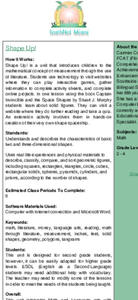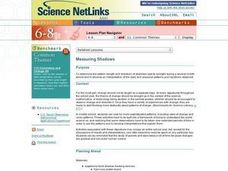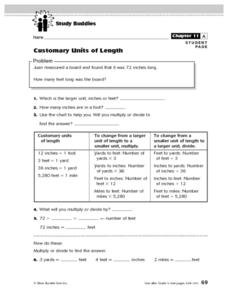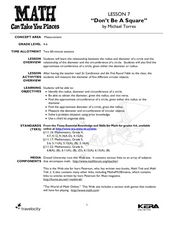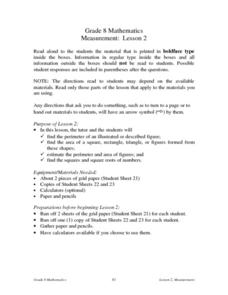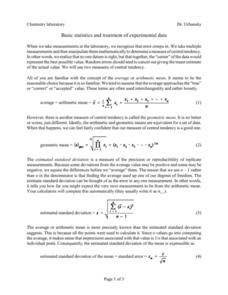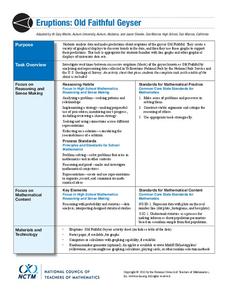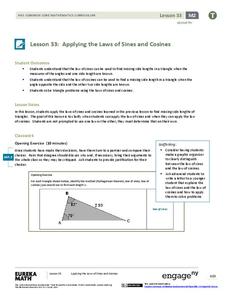Curated OER
Shape Up!
Students investigate measurement through the use of literature through this series of lessons.
Curated OER
Measuring Shadows
Students determine the pattern (length and direction) of shadows cast by sunlight during several month period, and develop interpretation of daily and seasonal patterns and variations observed.
Curated OER
Customary Units of Length
In this mathematics worksheet, 5th graders identify which is the larger unit, inches or feet. Then they use the chart to help them in solving the problems listed. Students also identify whether they multiply or divide for each answer.
Curated OER
Adding and Subtracting Polynomials
In this polynomials worksheet, 9th graders solve and complete 17 different problems that include adding and subtracting various polynomials. First, they determine the sum or difference of each equation listed, combining like terms when...
Curated OER
Don't Burst My Bubble
Middle schoolers practice using measuring techniques by examining bubbles. In this geometry lesson, students utilize mathematic formulas to discover the circumference and diameter of soap bubbles they blow. Middle schoolers...
Curated OER
Length - Comparing Height and Length
For this geometry worksheet, learners examine the height of 4 trees. They tell which tree is the tallest, make comparisons in 2 questions. They look at a picture of a pen, and a blue strip which they compare to the given units of measure...
Curated OER
Don't Be a Square
Students analyze the relationship between radius and diameter. Students read Sir Cumference and the First Round Table then take measurements of circular items from around the room. Students compute the radius, diameter...
Curated OER
Measurement: Lesson 2
Fourth graders find the perimeter of a geometric shape by adding the lengths of the sides. They find the area of a square or rectangle by counting square units. Students use multiplication to find the area of a rectangle. They estimate...
Curated OER
High School Mathematics Problems from Alaska: Fire Fighting Crew
Students apply mean, median and mode calculations of firefighter test scores to decide on hiring.
Curated OER
Discovering the Magical Pi
Students calculate pi using data on the circumference and diameter of various objects. They define key vocabulary terms, measure the circumference and diameter of various circular objects, organize the data on a table or chart, and...
EngageNY
Using Sample Data to Compare the Means of Two or More Populations II
The 23rd segment in a series of 25 presents random samples from two populations to determine whether there is a difference. Groups determine whether they believe there is a difference between the two populations and later use an...
Curated OER
Basic Stats
In this chemistry worksheet, young scholars focus upon the concepts of mean and standard deviation and how it is used in the laboratory to interpret data.
EngageNY
Incredibly Useful Ratios
Start the exploration of trigonometry off right! Pupils build on their understanding of similarity in this lesson that introduces the three trigonometric ratios. They first learn to identify opposite and adjacent...
National Council of Teachers of Mathematics
Eruptions: Old Faithful Geyser
How long do we have to wait? Given several days of times between eruptions of Old Faithful, learners create a graphical representation for two days. Groups combine their data to determine an appropriate wait time between eruptions.
EngageNY
Describing the Center of a Distribution
So the mean is not always the best center? By working through this exploratory activity, the class comes to realize that depending upon the shape of a distribution, different centers should be chosen. Learners continue to explore...
EngageNY
Using Trigonometry to Determine Area
What do you do when you don't think you have enough information? You look for another way to do the problem! Pupils combine what they know about finding the area of a triangle and trigonometry to determine triangle area when they don't...
EngageNY
Unknown Angles
How do you solve an equation like trigonometry? Learners apply their understanding of trigonometric ratios to find unknown angles in right triangles. They learn the meaning of arcsine, arccosine, and arctangent. Problems include...
EngageNY
Secant Lines; Secant Lines That Meet Inside a Circle
Young mathematicians identify different cases of intersecting secant lines. They then investigate the case where secant lines meet inside a circle.
EngageNY
From Circle-ometry to Trigonometry
Can you use triangles to create a circle? Learners develop the unit circle using right triangle trigonometry. They then use the unit circle to evaluate common sine and cosine values.
Illustrative Mathematics
Sum of Angles in a Polygon
How can learners use algebra to solve a geometry problem? Help learners create an equation that shows the relationship between the number of sides of a polygon and the sum of the interior angles. Young scholars are asked to divide the...
EngageNY
Applying the Laws of Sines and Cosines
Breaking the law in math doesn't get you jail time, but it does get you a wrong answer! After developing the Law of Sines and Cosines in lesson 33 of 36, the resource asks learners to apply the laws to different situations. Pupils must...
EngageNY
The Scaling Principle for Area
As they investigate scaling figures and calculate the resulting areas, groups determine the area of similar figures. They continue to investigate the results when the vertical and horizontal scales are not equal.
EngageNY
Informal Proof of AA Criterion for Similarity
What does it take to show two triangles are similar? The 11th segment in a series of 16 introduces the AA Criterion for Similarity. A discussion provides an informal proof of the theorem. Exercises and problems require scholars to apply...
Curated OER
Range, Cluster, Gap and Outliers
There are a number of activities here where learners collect and record data, as well as, activities where the likelihood of an event happening is calculated given the experimental probability. Young statisticians organize information...
